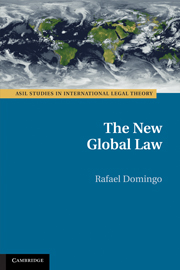1 - The Ius Gentium, a Roman Concept
Published online by Cambridge University Press: 06 July 2010
Summary
A LAW FOR EVERY AGE
Every age has its law. Cuius tempora eius ius – one may say in the language with which Europe was built. In every age of history, the law has had its own language – Latin, German, French, and English mainly – and its own idiomatic way of generating concepts.
Law is life; it is experience. The words U.S. Supreme Court Justice Oliver Wendell Holmes uses to begin his well-known work, The Common Law, have gone around the world: “The life of the law has not been logic: it has been experience.” As different sociological conditions arise, new forms of juridical–political organizations, laws, jurisprudence, and mechanisms for conflict resolution become necessary, and with them new ideas, new concepts, and new paradigms.
The Hellenic polis, the Macedonian Empire, the Roman Republic and the later Roman Empire, the medieval Res Publica Christiana, and the rise of nation-states are all responses to different times and places. Something similar may be said of the forms of organization and conflict resolution within the ambit of Islamic, Chinese, Japanese, or Hindu law. The structure and government of these political systems and their cultural worldview determined their idiosyncratic concept of law. Despite this, all stages in humanity's legal development have a common thread: the presence of relationships of justice among persons or groups needing rules to resolve disputes. The etymology of the word “justice” appears to confirm this juridical ethos: ius stitium – the cessation of claims.
- Type
- Chapter
- Information
- The New Global Law , pp. 3 - 11Publisher: Cambridge University PressPrint publication year: 2010



